- Home
- Lisa Smedman
Forgotten Realms - The Lady Penitent - Ascendancy of the Last Page 2
Forgotten Realms - The Lady Penitent - Ascendancy of the Last Read online
Page 2
T’lar pointed at the priestess. “She promised to cure you, didn’t she?” She touched the platinum disk that hung against her bare chest, fingers caressing the embossed spider, then pointed at the bites. “Would you like me to cure you?”
The wild elf stared at her. He couldn’t speak while gagged, but T’lar caught the slight widening of his pupils. He underŹstood her meaning, if not the words themselves. He believed she could cure him. He obviously hadn’t dealt with the drow before now. He grunted something from behind the gag and jerked his head in a nod.
She yanked him to his feet. “Yathzalahaun,” she ordered, giving him a rough shove.
He stumbled away from the river, into the forest. She followed.
They walked for some time, the wild elf forced by his hobble to take short, shuffling steps. With his arms bound behind him, he fell frequently. T’lar yanked him back to his feet each time and forced him on. The moon rose, round and full, throwŹing the forest into stark patches of light and shadow. T’lar squinted against the glare and carefully noted the direction they traveled. She would need to find her way back, later, to the cleft near the river that led back to the Underdark.
Fortunately, this region of the World Above had many landmarks. They passed a number of mounded hills, each capped by a thick tangle of trees and vines, and chunks of weathered stone half-buried in the ground. T’lar clambered over a fallen obsidian column, carved in the shape of a person with four arms folded across their chest. Whether it was meant to represent male or female, T’lar couldn’t tell; there were no obvious genitalia. Moonlight threw the glyph carved into its forehead into shadow. T’lar was no scholarshe couldn’t read the glyph itselfbut she recognized it as an archaic form of Espruar. She glanced around at the hills and realized they were the ruins of ancient structures. So perversely fertile was the World Above that soil and vegetation had completely hidden the tumbled buildings under a thick, loamy skin.
The wild elf halted before one of the hills and gestured by jerking his head in that direction. One of the trees sprouting from the hill had fallen, leaving a hole in the mound that revealed the masonry beneath. T’lar peered into the hole and saw a glint of metal: an adamantine door. Its hinges had torn free of the crumbling stone, allowing the door to fall inward. Now the metal formed a natural ramp into the darkness at the mound’s hollow center.
The wild elf glanced back at her, obviously reluctant to venture into it. T’lar shook her head. She snapped a kick at the back of his legs, knocking him to his knees, and pointed. “Inside.”
The wild elf glared at her, but complied. He wormed his way forward on his belly, into the hole. T’lar crouched and folŹlowed cautiously, Nafay’s dagger in hand. She smelled damp earth, and spider musk. A cobweb brushed her face. But the attack she had anticipated didn’t come. Though webs were everywhere, the inside of the ancient building did not contain a spider.
There was enough room inside to stand. T’lar looked around. The black marble floor had a bowl-shaped depresŹsion at its center. A tracery of white veins threaded through the marble: hair-thin lines reminiscent of a tangled web. The walls were carved, three of them in glyphs she couldn’t read that ran in narrow rows from ceiling to floor. The fourth wall bore a mural topped by a glyph T’lar did recognize: Araushnee. Lolth’s original name.
This was clearly an ancient temple.
T’lar fell to one knee and turned her head, exposing her neck. “Dark Mother of all drow, your servant offers herself.”
This ritual performed, she rose and studied the mural. It depicted an enormous spider with a drow face superimposed upon its abdomen. Eight drow arms radiated from its body. Each ended in a hand with eight fingers. Lines extended from each hand, linking the central figure to four pairs of smaller spiders, each with a face on its abdomen. The faces of the first pair were masked, while the second pair had gaunt, almost skeletal features and hollow eyes. The third pair had faces like melted wax, sagging and distorted, while the fourth pair had mouths open and spider arms lifted, as if they were singing the larger spider’s praises. The eight lesser spiders dangled from the central figure’s finger-webs like newly hatched spiderlings twisting in the wind.
The imagery was like nothing T’lar had ever seen before. It felt old, archaic. Not quite right. Yet strangely compelling. And Lolth had woven a path for her to this place. Why?
Using Nafay’s dagger, she pricked each of her fingers. She pressed her fingertips against the abdomen of the large spider, leaving small dots of blood. “Hear me, Dark Mother. Show me your will.”
She heard a muffled voice behind her: the wild elf, trying to say something against his gag. She turned and saw a fist-sized spider descending from the ceiling on a thread of silk. The spider was night black, with a red hourglass on its abdomen. As it descended, purple faerie fire blossomed in a flickering halo around its body. The wild elf threw himself to the side, rolling away from it.
Lolth had made herself known.
T’lar strode to the wild elf and caught him by the hair, dragging him to the bowl-shaped depression. The spider halted in its descent, twisting around on its thread, just over T’lar’s head. Watching. T’lar held up Nafay’s dagger and kissed the blade. Then she yanked the wild elf’s head back, bending his body in an arc that exposed his throat. He screameda wild wail that forced itself past the gag. He fought T’lar with all his strength, trying to hurl himself backward, to tear free and escape, but her grip was relentless.
She touched her dagger to his throat. She pricked it, making a puncture that barely broke the skin.
“Accept this sacrifice, Dark Mother,” she intoned.
She jabbed again. A little deeper, this time. His muffled wail grew shriller. He fought with the frenzy of a trapped animal, but T’lar’s grip remained as strong as adamantine. The wild elf twisted around and kicked her legs. She neatly sidestepped the thrashing limbs.
“Taste his fear.”
Another thrust, a little deeper.
“Feast upon him.”
Blood trickled down his throat. She stabbed a fourth time.
“Feast upon his blood.”
Another thrust.
“Consume him.”
She stabbed again.
“Rend his soul.”
She thrust again. Deep enough, this time, to pierce the windpipe. His breathing grew rapid with panic. Blood bubbled in a froth from the wound.
“Take him!”
On her eighth and final thrust, the blade plunged to the hilt. She yanked it free, releasing a hot spray of blood. She jerked his head to the side, letting blood splash the mural. Then she forced the weakly squirming sacrifice down into the depression in the floor. The wild elf died then, and blood stopped pulsing from the wound. T’lar lifted him by the ankles and waited as he bled out. The bowl-shaped depression filled with blood. She cast the corpse aside and kissed the blood-slick dagger a second time, tasting his blood. Then she watched as the purple-limned spider resumed its descent.
It plunged into the bowl of blood. Faerie fire rippled upon the surface of the bright red pool, turning it the color of an old bruise. Then the blood drained away. The depression in the floor was as it had been before the sacrifice: empty and waiting.
T’lar heard the sound of stone grating on stone, coming from the direction of the mural. She whirled, dagger still in hand. Lolth’s abdomen was sinking into the wall. Abruptly it fell away, crashing to the floor of whatever chamber lay beyond this one and sending up a cloud of stale dust. For several moments, there was silence. Then T’lar heard a scrabŹbling sound. She braced herself, preparing for whatever the goddess was about to hurl at her. Lolth was fond of testing her supplicantsand failure usually meant death.
A voice, as dry as ancient leather, creaked out of the openŹing a female voice, pitched too low for T’lar to make out most of the words. One came through clearly, however: the name of the goddess. Lolth.
“Spider Queen!” T’lar cried exultantly. “I am your willing
servant.”
Something moved in the space beyond the mural, something large and dark, forcing itself into the hole T’lar’s sacrifice had opened. It squeezed through headfirst, then halted, its shoulders too broad to pass. A bestial face, more demon than drow, stared out at T’lar and snarled. Blood trickled out of the opening and puddled at the base of the wall. The openŹing suddenly widened, then contracted, forcing the demonic creature through. It landed on the ground, gasping.
The demon-drow was twice as large as T’lar was tall, and female, with eight spider legs protruding from her chest. Her hair was a matted tangle that looked like old spider silk. Under each of her eyes was a hairy bulge, from which a fang-tipped jaw curved, the points meeting above the mouth. The jaws gnashed as she lay on the floor, moaning.
T’lar was certain the demon-drow was Lolth’s, though she’d never seen anything like her. “What are you?” she asked. “One of Lolth’s handmaidens?”
The demon-drow looked up. “Lolth’s handmaiden?” she croaked. The word wrenched itself from her mouth. Her wild cackle filled the hollow temple and sent a thrill down T’lar’s spine. The laugh was chaos itself, uncontrolled and as dangerŹous as a rock fall.
Then the demon-drow began to sing.
The song was harsh, as if the creature’s throat was tight and parched. Yet the notes filled the temple with magic that plucked at the spiderwebs and made them vibrate like the strings of a lyre. T’lar could feel it within her own body: a thrumming surge of power. The demon-drow had been withered and gaunt when she fell out of the hole in the wall, but she rose to her feet plumped and visibly stronger. When her song ended, she stood solid and strong. She stared down at T’lar.
“What month is it? What year?”
T’lar met the demon-drow’s gaze unflinchingly. Lolth hated weakness, and so did the demons that served her. “The month of Ches, in the Year of the Cauldron1378, by the reckoning of the World Above.”
The demon-drow shook her head. “Five months.” She stared down at her hands and arms, then abruptly clenched her fists. “Who are you?”
T’lar bowed. “T’lar Mizz’rynturl of the Velkyn Velve, assasŹsin of the Temple of the Black Mother.”
The demon-drow looked down at her, an expression of open amusement on her face. “Assassin?” she said. “Were you sent to kill me?”
“Indeed no! I serve Lolth.”
“That’s fortunate.” The demon-drow’s voice dropped to a harsh whisper, and she leaned closer, leering. “No mortal can kill methough many have tried.” She reared back and shouted, “The void itself has no effect on me!”
T’lar was starting to suspect that this was something much more powerful than a yochlol. Some new form of demon that Lolth herself had spawned. “By what name should I address you, Mistress?”
The demon-drow was silent for several moments. Her spider jaws gnashed. At last she answered, “The Lady Penitent.”
It sounded like a title a powerful being might use. “Are you a demon lord?”
The Lady Penitent snapped out a laugh. Her eyes looked wild. “More than that. Much more.” She waved a misshapen hand at the mural on the wall. “I even have my own temple.”
T’lar nodded, her chest tight with excitement. Had she just played midwife to some ancient and long-forgotten deity? She kept her face expressionless, despite the surge of emotion that left her near giddy. The Spider Queen must have been watching when Nafay died. And again when T’lar offered up her sacrifice. Lolth was known for her caprice. It would not be unheard of for the goddess to reward a mere assassin with power that would make a priestess weep. The services of a demigod’s avatar, for example.
“Your song,” T’lar said. “I felt its power.”
“Lolth’s dark chorus? Bae’qeshel?”
T’lar hadn’t heard the word before, but to admit that would be to show weakness. And deities spawned of chaos and blood despised the weak. She nodded and spoke boldly. “I want to learn it. Teach me.”
The Lady Penitent cocked her head. For a moment, her expression seemed melancholic. Almost mortal. “You remind me of someone. A young female, heir to the throne of House Melarn. She asked the same thing, once.”
“What happened to her?” T’lar asked.
The Lady Penitent bared jagged teeth. “She died.”
T’lar refused to be cowed. “She was unworthy, then.”
“Yes,” the Lady Penitent said in a harsh whisper. “She was … weak.” Her lips twisted into a grimace.
T’lar stood firm before the Lady Penitent. “In me, you will find strength. And determination. I journeyed all the way from Guallidurth to do my valsharess’s bidding.”
“Guallidurth? The city with as many sects as an egg sac has hatchlings?”
T’lar felt a sliver of apprehension. The deity was challenging hertesting her faith. Fortunately, T’lar’s commitment was strong. The Temple of the Black Mother was one of the youngŹest in the city. It had splintered away from the Yorn’yathrins a mere six decades ago and had yet to rise to prominence, but rise to prominence it would. Especially under the tutelage of a demigod’s avatar.
“The priestesses of the Black Mother are fervent in their devotions,” she assured the Lady Penitent. “They will serve you well.”
The avatar lifted an eyebrow. “Will they?” A dark chuckle rose from her throat like a bubble of blood. “Guallidurth,” she whispered, her eyes hungry.
T’lar nodded her head in a bow. “What is your pleasure, Lady Penitent? Shall I return to Guallidurth and announce your birth?”
The Lady Penitent smiled, a feral gleam in her eye. “Yes. Do that.”
CHAPTER 2
The Month of Flamerule
The Year of the Lost Keep (1379 DR)
Leliana leaned on the railing of the bridge that spanned the Sargauth, watching as the three fisherfolk below hauled on the line that would bring in their net. Over the rush of the underground river, she heard voices from the Cavern of Song: the faithŹful, singing Eilistraee’s praises. Though most of the voices were female, a few held a lower timbre. Even after three and a half years, it still seemed odd to hear male voices echoing through the caverns of the Promenade.
A shaft of moonlight sprang into being a short distance away, slanting down to the river. It was as if a window had opened in the rock overhead, allowing light to shine in from the World Abovelight that overpowered the shimmer of Faerzress that permeŹated the cavern walls. The moonbeam was magical, a manifestation of Eilistraee’s songa reminder that the goddess was watching over her faithful in this, her holiest of shrines.
The moonbeam played briefly over the river, making the water’s ripples sparkle. The fisherfolk tucked the line under their arms and made the sign of the goddess, touching foreŹfinger to forefinger and thumb to thumb to form a full-moon circle. Only when the moonbeam disappeared did they resume hauling in the net. The line suddenly pulled taut, drops of water flicking from it. The three pulled harder on it, but the net didn’t budge. It appeared to have snagged. Likely it had caught on the jumble of masonry on the river bottom: the remains of the original bridge.
One of the fisherfolk was a drow male; the second, a human female with skin so pale it seemed ghostly in the darkened cavern. The third was a muscular half-orc. He bared tusklike teeth in a grimace and pulled as hard as he could, but the net refused to come unstuck.
“Jub!” Leliana called down to him. “If you keep pulling like that, you’ll tear the net.”
The half-orc gave one last grunting pulland sprawled backward on top of the other two fisherfolk as the tension left the line. A portion of the net rose from the river, dripping and filled with wriggling white blindfish. So did something else. Large and metal and rusted, it creaked as it moved. It looked like an enormous hook, thick as a heavy tree branch and tipped with a barbed point. The base of the hook, now bent, was attached to something deeper in the river that was too large and heavy to move.
Leliana belonged to the third of th
e temple’s watches. Her patrol didn’t begin until moonset. But she was a Protector, entrusted with one of the temple’s legendary singing swords. Anything this unusual warranted her immediate inspection, on duty or off. She strode along the riverbank to the spot where the three lay worshipers stood.
She nodded at them and touched the ceremonial dagger that hung against her chest. Then she sang a prayer: one that began softly, but that rose steadily to a crescendo with the power of a waterfall. At its conclusion, she chopped a hand through the air like a sword blade slicing down. Forced apart by her magic, the river split in a V-shaped trough that extended almost to its center. The depression widened, forcŹing the water back on either side. The remainder of the river rushed on swifter than before, compensating in speed for the narrowed space.
The gap in the river revealed an enormous mass of rusted iron, large enough to fill a small room. It lay, tipped sideways, on the river-smoothed blocks of stone from the original bridge. It was the statue of an enormous scorpion, its legs twisted beneath it and one pincer claw splayed out to the side. Its barbed tail had snagged the net.
The human stared at it through dark-lensed goggles that allowed her to see in the Underdark. “What is it?” she asked. “A statue from the first bridge?”
Leliana shook her head. She’d been assigned to the Promenade little more than a year and a half ago, but she’d made it her business to learn all she could about the temple since then. In the earliest days of the Promenade, when the first bridge was in ruins and the river impassable, a scorpion-shaped construct had been sighted, on occasion, in the caverns that opened onto the eastern banks of the Sargauth. When the Protectors extended their patrols into the caverns to the southeast a few years ago, they’d expected to run into it, but the construct had seemingly disappeared. It had, they surmised, either wandered away into some deeper corner of Undermountain or been summoned home by its maker.

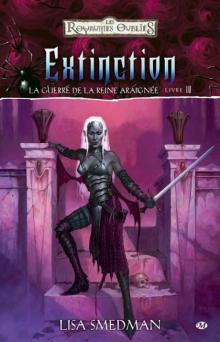 Extinction
Extinction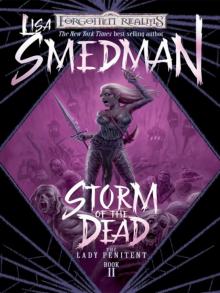 Storm of the Dead
Storm of the Dead Blood Sport
Blood Sport The Lucifer desk (s-2)
The Lucifer desk (s-2)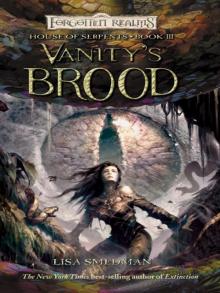 Vanity's Brood
Vanity's Brood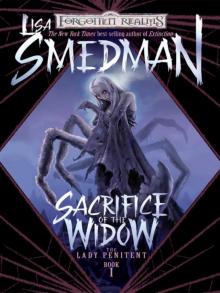 Sacrifice of the Widow
Sacrifice of the Widow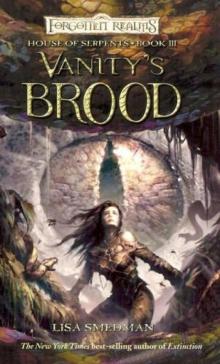 Vanity's brood hos-3
Vanity's brood hos-3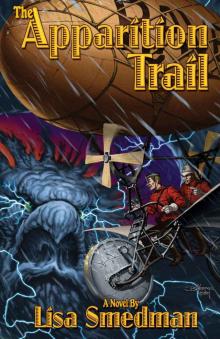 Apparition Trail, The
Apparition Trail, The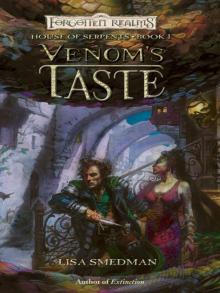 Venom's Taste
Venom's Taste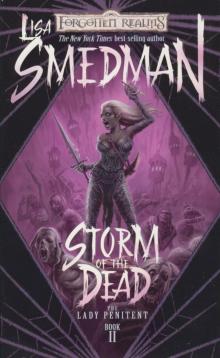 Forgotten Realms - The Lady Penitent - Storm of the Dead
Forgotten Realms - The Lady Penitent - Storm of the Dead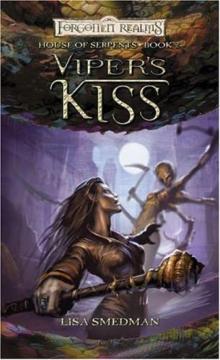 Viper's kiss hos-2
Viper's kiss hos-2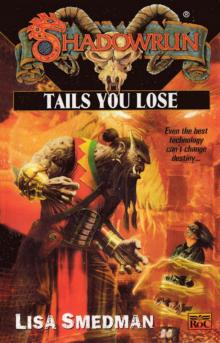 Tails You Lose
Tails You Lose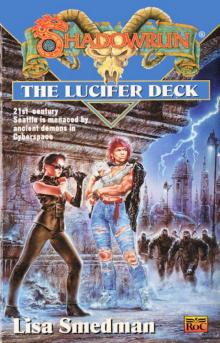 The Lucifer Deck
The Lucifer Deck Vor: The Playback War
Vor: The Playback War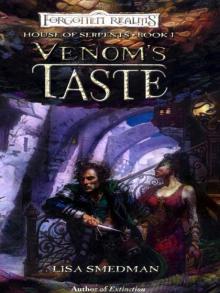 Forgotten Realms - House of Serpents 1 - Venom's Taste
Forgotten Realms - House of Serpents 1 - Venom's Taste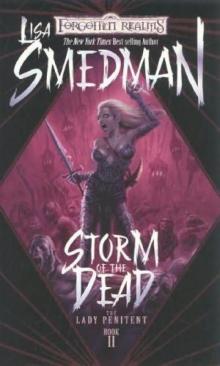 Storm of the Dead зкp-2
Storm of the Dead зкp-2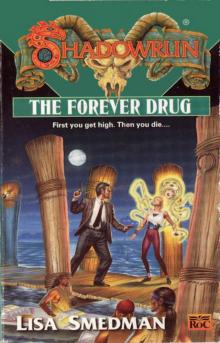 The Forever Drug
The Forever Drug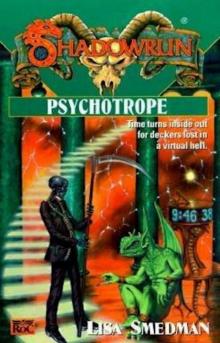 Psychotrope
Psychotrope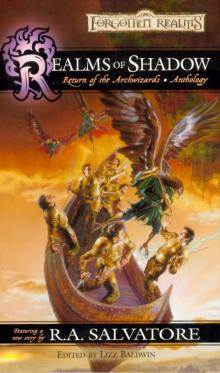 Realms of Shadow a-8
Realms of Shadow a-8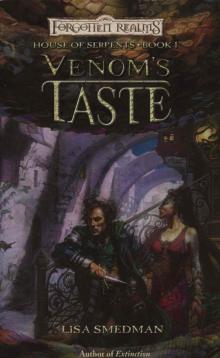 Venom’s Taste hos-1
Venom’s Taste hos-1 Psychotrope s-33
Psychotrope s-33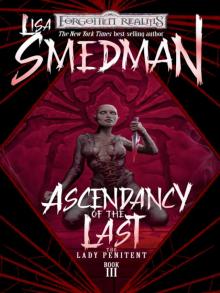 Ascendency of the Last
Ascendency of the Last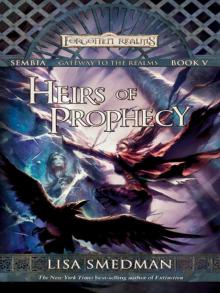 Heirs of Prophecy
Heirs of Prophecy Ascendancy of the Last зкp-3
Ascendancy of the Last зкp-3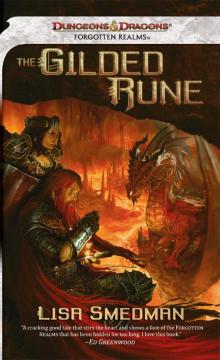 The Gilded Rune (forgotten realms)
The Gilded Rune (forgotten realms)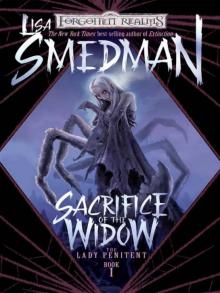 Sacrifice of the Widow: Lady Penitent, Book I
Sacrifice of the Widow: Lady Penitent, Book I The Lucifer desk s-23
The Lucifer desk s-23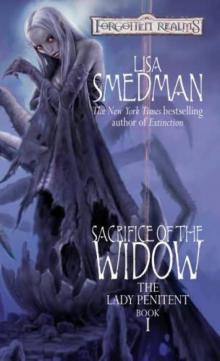 Sacrifice of the Widow lp-1
Sacrifice of the Widow lp-1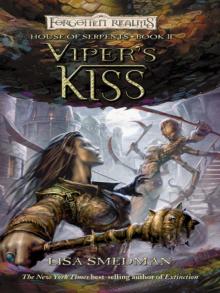 Viper's Kiss
Viper's Kiss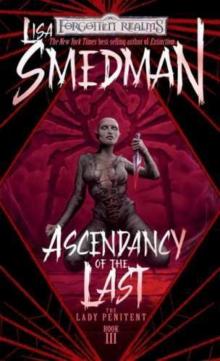 Forgotten Realms - The Lady Penitent - Ascendancy of the Last
Forgotten Realms - The Lady Penitent - Ascendancy of the Last